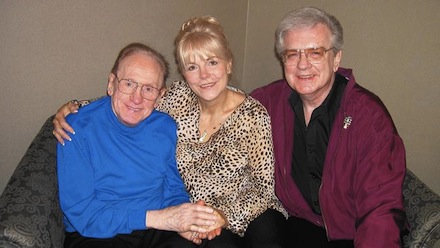Media: October 2016
In 2014, when WGN Radio unveiled their Walk of Fame, two of the inductees were their long-time overnight team – the husband and wife radio duo of Steve King and Johnnie Putman.
“That was one of those pinch-me moments,” King says now. “To be mentioned in the same breath as Wally Phillips and Bob Collins was an honor.”“And to be inducted the same time as Ron Santo,” Johnnie adds, “I just loved that man, and I was sitting right there next to his wife. When they acknowledged us I thought it was cool that not only did they recognize us a team, but they gave each of us our own separate acknowledgement as well. That meant a lot to us.”
After 27 years doing the overnight shift, their lives changed dramatically over the last few years, and they are still making the adjustment. “I have quickly adjusted to going back to sleep at night,” Putman says, “but Steve on the other hand has not. He’s still up all night and sleeps in the morning, and I wake him up around Noon and say, ‘It’s time to start your day.”
But it’s not like they spend their days lollygagging. “We never knew we would be busy as we are,” King says, “not having a five-day-a-week work schedule. ”One of the things they’ve been working on is a book that was recently released via Bantam Bay Books, A Little More Les.
It’s about their long-time friend and weekly on-air guest, the late great guitarist Les Paul. “Les Paul is the guy that got me interested in guitar,” Steve says. “My brother played one of his records for me, and I thought ‘How is this guy doing this?’ And that was one of the things that really started my interest in the guitar.” “So interviewing Les was on his bucket list,” Putman explains. “Steve heard Les on Mike Rapchack’s show (WGN) and said ‘Do you think Les would ever talk to us?’ And Mike said ‘Sure, here’s his phone number!’ But Steve was scared to call him. He handed the number to the producer and said ‘Would you mind calling him?’”
“It was one of the few times I was intimidated,” admits King. “I’ve interviewed so many people and I’m never intimidated, but I was intimidated by Les.” He quickly discovered he needn’t be. Les Paul was warm and friendly, and instantly taken by the radio duo.
“His relationship with Mary Ford was one reason,” Putman says. “He never remarried after they divorced. They remained friends. But their relationship started when they worked together, and he saw them in us. Two professionals working together and getting along. He plugged into that.” Steve concurs. “He would occasionally, off the air, have conversations with us urging us to remember to balance the professional and the personal. He was always happy when we went on vacation. He would call us as we were heading down to Florida and say ‘Now you’re leaving the office behind right? You kids need this time together for each other.’”
Their personal friendship wasn’t the only reason King and Putman decided to write this book. They considered Paul an inspiration, and it’s not too hard to see why. “People don’t know the stuff that Les overcame,” King explains. “He wore two hearing aids. He had crippling arthritis. There’s a picture in the book with Les’ arm in a cast. In 1948, Les and Mary were coming home from a gig and they got into a car accident. Les woke up in the hospital with two doctors standing over his bed.
They both said that the elbow was shattered, and one of the doctors said they were going to have to take his arm. Luckily the other doctor recognized that it was Les Paul, and he needed his arm to play guitar. They told him they could fuse a bone into his arm there, but he wouldn’t be able to move his arm in or out. It would be in one fixed position. Les thought about that for a second and said, ‘OK, point my index finger toward my belly button.’ That way he could still shove a guitar into that slot. And even with all of that, he never complained. He never said ‘Woe is Me’, he just overcame it.”
Paul was such a frequent guest, Steve and Johnnie had 60 hours of interviews on tape to peruse while they were working on the book. “He would call us on his way home from the club on Monday nights,” Putman explains, “driving from New York to New Jersey. And he was always pumped up from the show, and wanted to tell us who was there at the club that night. He just wanted to chat. He was a night owl.” The people that excited him were not the musicians,” King adds.
“It was the norm for a Jeff Beck or a Paul McCartney to come in to see him, but he got excited over Scott Carpenter the astronaut because he could talk to him about technology. Richie Sambora and Slash absolutely idolized him. If they were in town, they made time to bow down to him. That was cool for him, but he would get giddy like a child after he talked to a scientist or an astronaut.”
And King and Putman get giddy like children when they talk about Les Paul. That passion comes through in the pages of A Little More Les, available at alittlemoreless.com and Amazon.com.











Great, inspirational reading. The added bonuses were a Rick using the word “lollygagging” and Mr. King invoking the name Slash. Saw Steve King host a Gavit high school dance with music by Oscar and the Majestics around 1968.